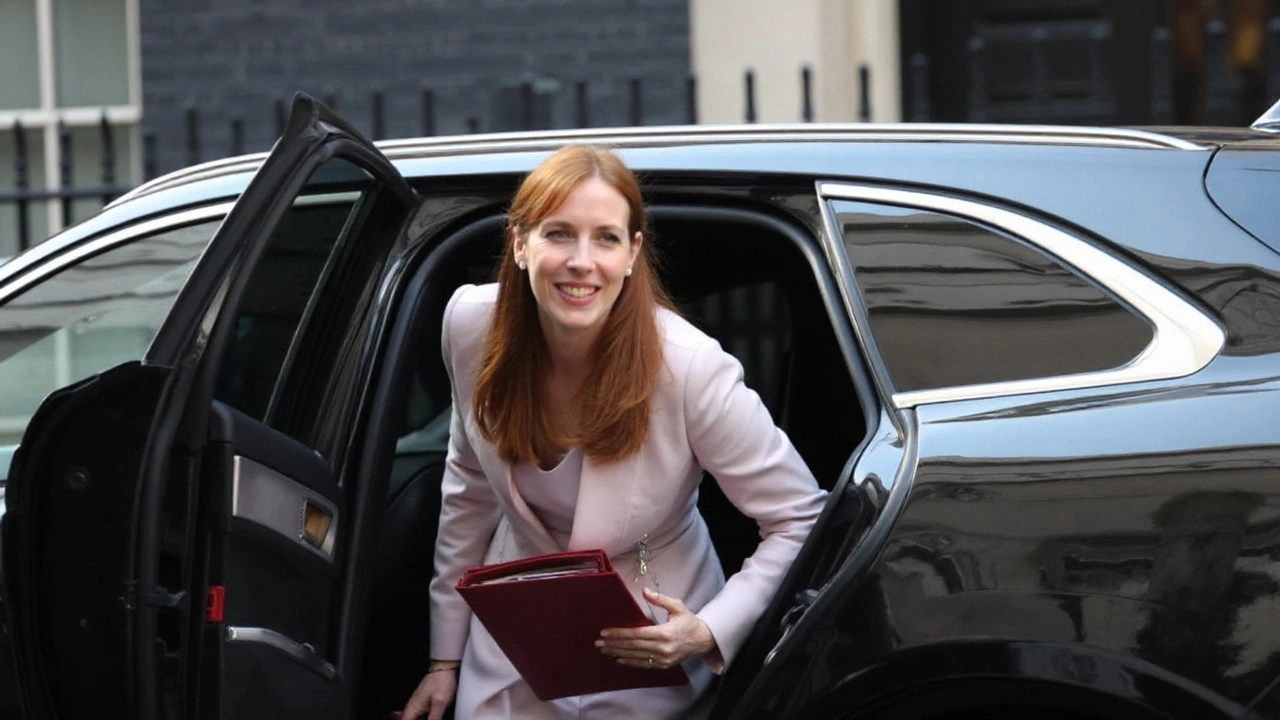Lammy steps in after Rayner quits over tax probe
A top job opened up in Downing Street and was filled within hours. Prime Minister Keir Starmer has appointed David Lammy as Deputy Prime Minister after Angela Rayner resigned from the post and as Labour’s deputy leader following a probe into her tax affairs. Lammy will keep his role running the justice department, signaling Starmer wants continuity at a moment of stress.
Rayner’s exit was triggered by findings that she underpaid stamp duty on an £800,000 flat in Hove that had been treated as a second home. In a resignation letter to Starmer, she said she “did not meet the highest standards” expected in her position. The admission and swift departure remove an immediate political headache for No. 10, but they also open a new front: a deputy leadership election inside Labour that could reshape the party’s balance of power.
Lammy’s promotion is a steadying move. The Deputy Prime Minister role isn’t defined in law and carries the weight the Prime Minister gives it. In practice, it means standing in during absences and acting as a senior sounding board across government. Keeping Lammy at Justice suggests Starmer wants him focused on delivering reforms in a department under pressure, while also acting as his political and strategic deputy.
Lammy, the long-time MP for Tottenham, brings deep government experience. He served in ministerial roles under the last Labour governments and has held senior briefs in opposition. As Justice Secretary, his in-tray is heavy: court backlogs, prison capacity strains, and confidence in the criminal justice system. Adding the Deputy PM title puts him at the center of cross-government problem-solving, from policing and probation to how the system handles victims and offenders.
Rayner’s departure is a jolt for Labour. She was a key face of the party’s levelling-up message and led on housing and local government. Her resignation removes a strong campaigner from the front line and forces the party to confront internal questions about direction and tone. She leaves with a blunt acknowledgment of falling short on standards, a reminder that integrity issues land hard in government.
Starmer’s response is to widen the reshuffle beyond one vacancy and reset the top team. The aim is clear: project grip, avoid drift, and press ahead with delivery.

Who’s where now — and why it matters
Several big moves landed alongside Lammy’s appointment:
- Yvette Cooper becomes Foreign Secretary. She is a seasoned operator, known for detail and discipline, and moves from domestic security to the global stage. The shift pairs a tough-minded minister with a portfolio spanning Ukraine, the Middle East, relations with Europe, and the UK’s post-Brexit trade and diplomacy agenda.
- Shabana Mahmood takes over as Home Secretary. Expect a focus on policing performance, border management, and the asylum system, plus the nuts and bolts of crime prevention. The Home Office is demanding; placing Mahmood there suggests Starmer wants a results-first approach.
- Rachel Reeves stays as Chancellor, which means three of the four Great Offices of State are now held by women — Prime Minister aside. That’s a milestone in British politics and a sign Starmer is backing proven hands at the top.
- Steve Reed becomes Housing Secretary, inheriting a brief previously attached to Rayner. Housing is one of the most politically sensitive issues in the country. Reed will be judged on whether he can speed up building, push planning reform through, and improve the prospects of renters and first-time buyers.
- Pat McFadden takes charge of a new super-ministry that brings together Work and Pensions with the skills brief from Education. That consolidation is about one thing: the workforce. Getting more people into well-paid jobs, retraining where needed, and linking benefits policy with employer demand. If it works, it could be the engine room for growth and productivity.
- Peter Kyle becomes Business Secretary, replacing Jonathan Reynolds. Kyle’s job is to keep investment flowing, work with industry on energy costs and regulation, and make the UK a more predictable place to build and expand.
Put together, these moves show Starmer wants a tighter grip on delivery. The foreign and home portfolios go to ministers trusted to avoid drama and focus on outcomes. Housing gets a full-time driver. Welfare and skills are merged to tackle labor shortages and long-term sickness more coherently. Business is asked to scale up, not just survive.
The timing matters. Government reshuffles usually come with risk — they can create winners and losers and trigger resentment. Doing it now, after a high-profile resignation, makes the need for stability even sharper. Starmer is betting that a refreshed team will move faster on the agenda voters notice: safer streets, shorter hospital waits, more homes, and steadier bills.
There’s also a constitutional angle. A Deputy Prime Minister who keeps a department is not new. Recent governments have done it to keep experienced figures in place. The trade-off is time: the deputy’s day is split between Cabinet-level coordination and the grind of a major ministry. Lammy will need a strong set of junior ministers and clear delegation at Justice to keep the court system moving while he handles No. 10 duties.
The Labour Party now has its own race to run. Rayner’s exit triggers a deputy leadership contest that will test the party’s coalition. The deputy leader is elected by members and affiliated supporters using one-member-one-vote, after candidates clear a nominations threshold from MPs and party bodies. The National Executive Committee will set the timetable, but the contest is likely to be quick, given the demands of governing.
The stakes are real. Labour’s deputy leader has a platform independent of Downing Street. A winner from the party’s left or soft-left could push harder on public ownership, public spending, and workers’ rights. A centrist winner might press for fiscal caution, market stability, and pragmatic reform. Either way, the result shapes the party’s tone and message heading into the next legislative crunch points.
Expect the campaign to revolve around standards in public life, economic credibility, and delivery. The tax affair that ended Rayner’s run has jolted Labour’s self-image on integrity. Candidates will promise transparency, and they’ll be judged on it. They’ll also be asked how to fund priorities without rattling markets, how to cut NHS and court backlogs, and how to build homes at pace without blowing up local consent.
On policy, the new line-up hints at a few early moves. At the Home Office, Mahmood has to get a grip on asylum backlogs and small boats while mending relations with police over resourcing and reform. At the Foreign Office, Cooper will try to steady ties with key allies, keep support for Ukraine on track, and cool disputes with European partners where possible. Success equals fewer surprises and steadier headlines.
Housing may be the fulcrum. Reed walks into a sector jammed by planning delays, expensive materials, and local resistance to new building. Expect pressure for clearer national targets, faster approvals on brownfield sites, and incentives for councils and developers to build. Renters want security and fairer rules; young buyers want a route onto the ladder. The politics are unforgiving if progress stalls.
McFadden’s super-ministry is a big bet on the supply side of the economy. If skills training starts matching real vacancies, and if people stuck on the sidelines can re-enter work with proper support, the payoff is growth without overheating. That’s the theory. Making it work means breaking down silos that have frustrated governments for years.
Kyle at Business will be judged on predictability. Firms hate constant policy churn. He’ll need to draw clear lines on energy, planning, and industrial strategy and stick to them. The goal is to convince investors that the UK won’t shift the goalposts mid-project.
Back in No. 10, Lammy’s dual role will be watched closely. The justice system needs wins people can feel: faster trials, safer streets, better support for victims, and less reoffending. If those metrics move in the right direction while he serves as Starmer’s deputy, it strengthens the argument that this reshuffle put doers in charge.
Opposition parties will circle. Expect them to question why the Deputy Prime Minister also runs a department, and to press for more clarity on the Rayner timeline and any tax repayments. That drumbeat won’t stop soon. The government’s answer has to be relentless delivery and visible standards.
For Labour members, the deputy leadership contest is the next big moment. It will serve as a referendum on how the party wants to govern under pressure. For voters, what matters is simpler: whether this new Cabinet can get on with the job and improve daily life. The reshuffle suggests Starmer knows that’s the test — and that he doesn’t have time to waste.
